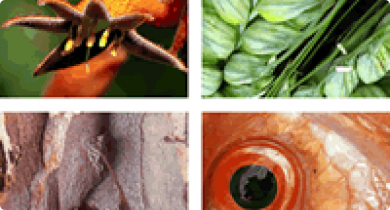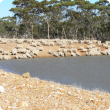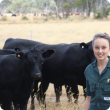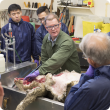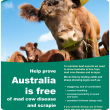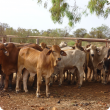Biosecurity & quarantine
The Department of Agriculture and Food, Western Australia (DAFWA) works with primary industries to safeguard our agricultural resources from biological threats and to maintain our export opportunities.
The State’s reputation is underpinned by a comprehensive biosecurity and quarantine system, developed and operated by DAFWA.
DAFWA is involved with:
- creation of surveillance and diagnostic programs
- animal and plant risk assessments
- importing and exporting requirements
- creating mechanisms to respond to incursions
- livestock movement and identification
- development and maintenance of biosecurity and quarantine legislation.
To find out more about what we do to protect agricultural production and export opportunities within the State please search our website.
Filter by search
Filter by topic
- Livestock species (14) Apply Livestock species filter
- (-) Remove Pests, weeds & diseases filter Pests, weeds & diseases
- Livestock & animals (14) Apply Livestock & animals filter
- Biosecurity (14) Apply Biosecurity filter
- (-) Remove Beef cattle filter Beef cattle
- (-) Remove Sheep filter Sheep
- Livestock disease surveillance (12) Apply Livestock disease surveillance filter
- Livestock health & diseases (12) Apply Livestock health & diseases filter
- Livestock biosecurity (12) Apply Livestock biosecurity filter
- Diseases (12) Apply Diseases filter
- Dairy cattle (8) Apply Dairy cattle filter
- Livestock management (5) Apply Livestock management filter
- Goats (5) Apply Goats filter
- Pigs (4) Apply Pigs filter
- Horses (4) Apply Horses filter
- Control methods (3) Apply Control methods filter
- Emergency animal disease preparedness (2) Apply Emergency animal disease preparedness filter
- Mechanical, physical and cultural (2) Apply Mechanical, physical and cultural filter
- State Barrier Fence (2) Apply State Barrier Fence filter
- Invasive species (2) Apply Invasive species filter
- Management & reproduction (2) Apply Management & reproduction filter
- Pests (1) Apply Pests filter
- Poultry & birds (1) Apply Poultry & birds filter
- Preventing residues (1) Apply Preventing residues filter
- Pest mammals (1) Apply Pest mammals filter
- Residues in livestock (1) Apply Residues in livestock filter
- Feeding & nutrition (1) Apply Feeding & nutrition filter
- Chemicals (1) Apply Chemicals filter
- Export services (1) Apply Export services filter
- Food, export & investment (1) Apply Food, export & investment filter
- Pest animals (1) Apply Pest animals filter

